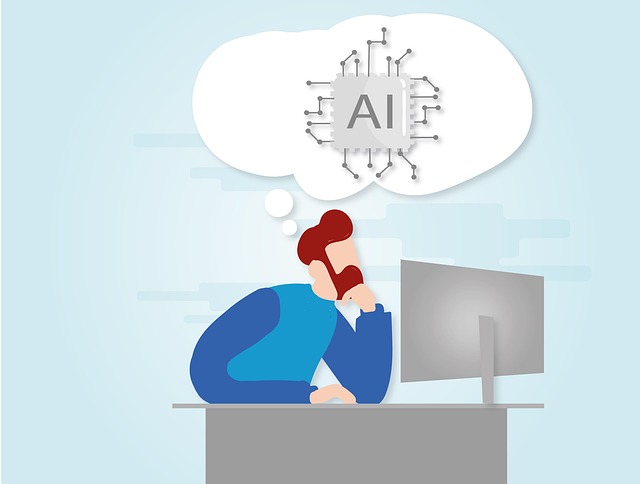Chatbot AI, powered by NLP and machine learning, revolutionizes business-customer interactions with 24/7 support, personalized solutions, and efficient task handling. Trained on diverse datasets, chatbots continuously learn, adapt to user needs, and gather valuable customer insights for data-driven strategies. Key trends include advanced NLP for more human-like text, multi-modal capabilities, contextual awareness, and enhanced data protection measures.
“Discover the transformative power of Chatbot AI: an innovative technology reshaping customer interactions. This comprehensive guide takes you on a journey through the fundamentals, exploring how these intelligent assistants improve user experiences. Learn about training methods and their role in fostering effective communication. We delve into integration strategies for seamless business operations and reveal emerging trends setting the course for the future of chatbot AI. Prepare to unlock the potential of this game-changing technology.”
- Understanding Chatbot AI: The Basics Unveiled
- How Chatbots Enhance Customer Experience
- Training and Development in Chatbot AI
- Integrating Chatbots into Business Operations
- Future Trends Shaping Chatbot AI Landscape
Understanding Chatbot AI: The Basics Unveiled

Chatbot AI, or Artificial Intelligence in chatbots, refers to the technology behind these conversational agents. It enables machines to engage in natural language conversations with users, simulating human-like interactions. At its core, chatbot AI involves sophisticated algorithms and models that process user inputs, generate appropriate responses, and learn from each interaction to improve over time.
The basics of Chatbot AI revolve around understanding user intent, extracting relevant information, and context management. These chatbots use Natural Language Processing (NLP) to interpret text or speech inputs, allowing them to comprehend queries and deliver meaningful outputs. With advancements in machine learning, these virtual assistants can adapt to different user needs, providing personalized experiences.
How Chatbots Enhance Customer Experience

Chatbots, powered by AI technology, are transforming the way businesses interact with their customers, delivering an enhanced and personalized experience. By leveraging natural language processing, these virtual assistants can understand and respond to customer queries in real-time, providing instant solutions and support. This immediacy improves satisfaction levels, as customers no longer face lengthy wait times for assistance.
Furthermore, chatbots offer 24/7 availability, ensuring that customers can receive help whenever they need it. They can handle a high volume of simple tasks and inquiries, freeing up human agents to focus on more complex issues. This efficient distribution of workload results in faster response times and improved overall efficiency, contributing to a positive brand image and fostering customer loyalty.
Training and Development in Chatbot AI

The development of a robust chatbot AI begins with rigorous training. This involves feeding vast amounts of data—including text, images, and even voice recordings—to the algorithm to teach it patterns and context. Machine learning techniques, such as natural language processing (NLP), enable these models to understand human language nuances. As chatbots evolve, continuous learning through interactions becomes key. Developers employ techniques like reinforcement learning, allowing chatbots to adapt based on user feedback, improving their performance over time.
Regular updates and refining algorithms are essential for chatbot ai’s growth. Developers can enhance their capabilities by introducing new data sets, fine-tuning parameters, and incorporating advanced NLP models. This iterative process ensures that these AI assistants stay relevant, provide accurate information, and offer engaging interactions as technology advances.
Integrating Chatbots into Business Operations

In today’s digital era, businesses are increasingly integrating chatbot AI into their operations to streamline processes and enhance customer experiences. Chatbots offer 24/7 availability, instant response times, and consistent delivery of information, thereby improving efficiency and reducing costs. They can handle a large volume of routine queries, allowing human agents to focus on more complex tasks that require empathy and critical thinking.
This integration isn’t just about cost savings; it’s also about data collection and analysis. Chatbots can gather valuable insights from customer interactions, providing businesses with actionable feedback for product development and marketing strategies. By continuously learning and adapting, chatbot AI contributes to a dynamic business environment where customer satisfaction and operational effectiveness go hand in hand.
Future Trends Shaping Chatbot AI Landscape

The future of chatbot AI looks promising, with several trends poised to shape its landscape. One prominent trend is the integration of advanced Natural Language Processing (NLP) technologies, enabling chatbots to understand and generate human-like text more accurately. This enhancement will improve user experiences, making interactions with chatbots feel more natural and intuitive. Additionally, the rise of multi-modal chatbots that can process and respond to various input types, including text, voice, and images, is expected. These versatile chatbots will be able to handle complex tasks, offering a seamless blend of conversational AI and visual understanding.
Another significant trend is the growing emphasis on contextual awareness, where chatbots learn and remember user preferences, conversation history, and personal details to deliver personalized responses. This level of customization will foster more meaningful conversations and increase user satisfaction. Furthermore, as privacy and security concerns grow, developers are focusing on implementing robust data protection measures in chatbot AI. This includes ensuring secure data storage, transparent handling of user information, and compliance with global privacy regulations, thus building trust among users.
Chatbot AI is transforming the way businesses interact with their customers, offering enhanced experiences through efficient and accessible support. As technology evolves, these virtual assistants will continue to play a pivotal role in shaping the future of customer service. By integrating chatbots into operations, companies can streamline processes, improve satisfaction rates, and stay ahead in the competitive market. This innovative technology is here to stay, revolutionizing communication and setting new standards for excellence in customer engagement.
